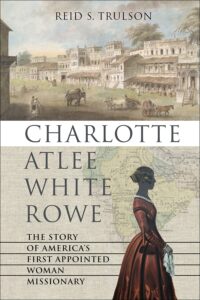
Boats sailing on the Ganges River in Varanasi, India.
Photo by Nayan Bhalotia on Unsplash
Forgotten educator’s challenge to gender bias
April 27, 2023
Gender bias, like a noxious weed, is hard to eradicate. One woman who made the attempt in America and India was American Baptist educator Charlotte Atlee White Rowe.[i]
Charlotte Atlee was born in Lancaster, PA in 1782 and orphaned by age eleven. She grew up in Massachusetts, married Nathaniel White, and within two years watched him and their only son die. She moved to Haverhill, Massachusetts where she was baptized in the Merrimack River and joined the Baptist Church. Later she moved to Philadelphia where she would twice face public scandal.
Charlotte White joined Philadelphia’s Sansom Street Baptist Church, a new church whose pastor was William Staughton. In 1814 she helped organize and lead the Sansom Street Baptist Female Society for Promoting Evangelical Missions.[ii] In 1815 the Baptist Board of Foreign Missions (now International Ministries) appointed Charlotte H. White for missionary service.
 Appointing a woman was controversial. No other denomination or mission agency in America had done so. Women were expected to confine their activities to the domestic sphere of home, family, church, and social visits while men engaged in the public sphere of industry, commerce, medicine, law and politics. Touring the United States in 1831, French diplomat Alexis de Tocqueville observed the intentional promotion of the “separate spheres” ideology. He wrote, “In no country has such constant care been taken as in America to trace two clearly distinct lines of action for the two sexes….”[iii]
Appointing a woman was controversial. No other denomination or mission agency in America had done so. Women were expected to confine their activities to the domestic sphere of home, family, church, and social visits while men engaged in the public sphere of industry, commerce, medicine, law and politics. Touring the United States in 1831, French diplomat Alexis de Tocqueville observed the intentional promotion of the “separate spheres” ideology. He wrote, “In no country has such constant care been taken as in America to trace two clearly distinct lines of action for the two sexes….”[iii]
That social context heightened the distinction between appointing a missionary and sending one. Appointment had organizational significance. It made the missionary an agent of the sending body and established mutual accountability between the two. It also had spiritual significance that bore similarity to a pastor’s ordination. Women were precluded from appointment because a missionary’s role was in the public sphere. Although other women had preceded Charlotte into mission service, none had been appointed. Ann Judson and others were viewed as volunteer assistants to male missionaries.
The perceived scandal of the Board’s action prompted a prominent Philadelphia Baptist pastor to lead an effort to revoke Charlotte’s appointment. He asserted that women were helpful and “ornamental” in the church, but appointing one usurped men’s authority.[iv] When the revocation attempt failed, others questioned whether the Board had sufficient funds to send her. As a result, Charlotte funded her own mission work.
Charlotte departed Philadelphia in December 1815 and arrived in India four months later. In Calcutta (Kolkata) she married Joshua Rowe, a widowed British missionary with three young sons. The Rowes served in Digah, a village on the Ganges 360 miles northwest of Calcutta. There Charlotte learned Hindi, gave birth to three children, started schools, taught students, recruited and trained teachers, wrote Hindi grammar and spelling books as teaching aids, and promoted education for girls. The powerful East India Company opposed educating Indian people, and local opinion resisted educating girls. Yet Charlotte persisted. She gained allies by publicly testing her students.
Although Charlotte Atlee White Rowe was the first woman to achieve equal missionary appointment with men, she was consistently overlooked and omitted from published reports. Her work in India and America was largely forgotten. To recognize Charlotte Rowe’s life and ministry is a matter of justice. Her courage and perseverance should inspire the unfinished work to eradicate gender bias in all its forms.
Although the controversy over Charlotte’s appointment had faded in Philadelphia, a new scandal erupted in 1821. Charlotte had written privately to her brother, Edwin Augustus Atlee, a Philadelphia physician. Without her knowledge or permission, Dr. Atlee showed one of her letters to the religious visionary Theophilus Ransom Gates, who published The Reformer, a radical monthly newspaper.
Gates rejected all forms of organized religion, including mission societies. The Reformer had already accused the British Baptist missionaries in Serampore, India of theft. Gates now printed an anonymous extract from Charlotte’s letter to support that claim. Then he named Charlotte Rowe as his source.[v]
Charlotte was astounded that her confidential correspondence had been repurposed as anti-missionary propaganda. Although she was too far away to defend herself in the Philadelphia press, she did not lack agency. She had just given birth to a son and named him Edwin Atlee Rowe. After learning about her brother’s role in the repurposed letter, Charlotte renamed her son Judson Ward Rowe in honor of American missionary Adoniram Judson and British missionary William Ward.
Joshua Rowe died in 1823. Charlotte was now a single parent of six children as she taught, supervised ten Hindi schools, managed the Digah mission station, repaired buildings, led a Hindi language church, and oversaw local evangelists. Although the evangelists with whom she served called her their “pastoress,” Charlotte continued to face gender bias. In America and England she was viewed as the wife of a missionary rather than a missionary herself.
Financial constraints eventually forced Charlotte to sail to London to request appointment by the British Baptists and a modest salary to continue her work in India. She found, however, that gender bias in England would make her appointment as controversial in London as it had been in Philadelphia.
In 1829 Charlotte Rowe returned to Philadelphia while her older stepsons remained in India. She opened a girls’ school in her home and published articles about her work in India in a weekly newspaper. She later taught in Alabama. By 1845 she returned to Pennsylvania where in 1850 she reopened the Strasburg Female Seminary as its new principal. After her last child died in 1852, she returned to Philadelphia.
Although Charlotte was the first woman to achieve equal missionary appointment with men, she was consistently overlooked and omitted from published reports. Her work in India and America was largely forgotten. She died on Christmas Day, 1863, and her funeral was held at the St. James Episcopal Church in Lancaster, Pennsylvania. She was buried beside her twin daughters in the St. James Cemetery—in an unmarked grave.
To recognize Charlotte Rowe’s life and ministry is a matter of justice. Her courage and perseverance should inspire the unfinished work to eradicate gender bias in all its forms.
Reid S. Trulson is the retired executive director/CEO of American Baptist International Ministries. His book Charlotte Atlee White Rowe: The Story of America’s First Appointed Woman Missionary (Mercer University Press, 2021) is based on his research in India, England and America.
The views expressed are those of the author and not necessarily those of American Baptist Home Mission Societies.
[i] Reid S. Trulson, Charlotte Atlee White Rowe: The Story of America’s First Appointed Woman Missionary (Macon, GA: Mercer University Press, 2021).
[ii] Origination and Constitution of the Sansom Street Baptist Female Society for Promoting Evangelical Missions: Formed June 27, 1814. (Philadelphia: R. P. & W. Anderson, 1814).
[iii] Alexis de Tocqueville, Democracy in America. Part the Second, The Social Influence of Democracy (New York: J. & H. G. Langley, 1840), 212.
[iv] Henry Holcombe, “On the Duties and Privileges of Female Members of a Gospel Church,” The Baptist Magazine (November 1810) 2:557.
[v] Theophilus Ransom Gates, “Serampore Missionaries,” The Reformer (April 1823) 4:73.


